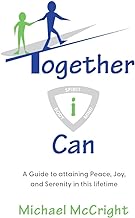January 4, 2024
Together i Can:
A Guide to Attaining Peace, Joy, and Serenity in This Lifetime
Michael W. McCright
Aviva Publishing (2023)
ISBN: 978-1-63618-283-4 (paperback)
New Book Explores How Removal of Ego Leads to Serenity
 Michael W. McCright’s new book Together i Can: A Guide to Attaining Peace, Joy, and Serenity in This Lifetime suggests that if we remove our egos, becoming lowercased “i” instead of uppercased “I,” we will discover we can do more and find greater peace and joy in the process.
Michael W. McCright’s new book Together i Can: A Guide to Attaining Peace, Joy, and Serenity in This Lifetime suggests that if we remove our egos, becoming lowercased “i” instead of uppercased “I,” we will discover we can do more and find greater peace and joy in the process.
The Together i Can Philosophy originated when Michael discovered the unfairness of “we.” It’s a situation many of us have been in. We’re assigned to be part of a group for a project. One or two people do all the work, but the entire group takes credit, saying, “Look what we accomplished.” Michael states: “I concluded I could never have accomplished the entire task I was assigned by myself. I recognized it takes a team working together. However, with that togetherness comes the demand for individual responsibility within the group. Hence, the change from ‘Together we can’ to ‘Together i Can,’ signifying that individual responsibility.”
Michael also realized that letting pride control our lives leads to becoming a doormat for others. He had to change, becoming a small “i” person, one who acts with humility and takes responsibility. To do a job properly, we need others’ help, but we also can’t take credit for what we’ve done. Once we learn to control the ego and become humble, we can start to develop balance in our lives.
Michael then takes the reader through the areas of our lives that must individually and together be in balance for us to achieve the joy and serenity we desire, which are more valuable than anything we might acquire through pride. Once we take responsibility for our lives, and using the words of The Serenity Prayer, realize life gives us two options—accept or change—we can make progress toward living a holistic (whole) life. That whole life requires that we be in balance spiritually, physically, and mentally.
Michael divides the book into several sections, with Spirit and God, Mind, and Body, being the key sections. For me, the Spirit and God section was the most interesting because Michael shares his thoughts on spirituality and God, offering definitions of terms and explaining that God does not necessarily mean the typical God of organized religion. Using many sources from the Bible, he discusses how soul, mind, and body each make up a third of our life. He compares that to a house made up of those three parts and brings in the biblical parable of the house built on sand. If even one of those three parts is built on sand, we are in trouble. Therefore, he encourages us to explore and find balance in all three areas.
Michael clarifies that for him God is not male or female and is a Higher Power, synonymous with the Higher Power of Twelve Step meetings, which he has attended for decades. He encourages us to let go of disabling beliefs about religion and anything else that we may have learned in the past and to keep developing new enabling beliefs. He also notes that we can never arrive at all the answers. Our beliefs and spirituality have to keep developing and expanding or we will simply stagnate. He realizes not everyone will believe what he believes when it comes to God. It is enough for him to know that he would not have been able to quit drinking without a Higher Power’s assistance. He encourages the reader to set out on their own searches for God as they understand God. He concludes, “My suggestion is to continue pondering, questioning, and expanding your definition of God and not stopping at what seems like a destination. Destinations close minds because you have decided what you believe.”
In the section on the Mind, Michael discusses how the mind is composed of two separate entities, the conscious and unconscious. He advocates for therapy with the warning we have to go not just to talk about our problems but with the intent of solving them. We also have to decide what we want in life, not just playing a role in a play someone else wrote for us. We have to develop a belief and passion around what we want and then take action to make it happen. He also is a firm believer in intuition as a guidance system. Finally, he discusses how better mental health occurs when we change our beliefs from disabling to enabling beliefs. Changing definitions and self-talk can make a huge difference in changing our life patterns.
The section on the Body is less metaphysical and more practical. Michael provides several chapters on areas we need to explore to keep our bodies in balance. From tips on breathing more deeply and how to hydrate properly to discussions on eating more fiber, doing colon cleansing, and getting proper exercise, there’s something every reader can benefit from and feel inspired by to make beneficial changes in their own lives.
Overall, Together i Can is a powerful guide that will help you attain optimal health in your mind, body, and spirit. The results will be peace, joy, and serenity. Michael is now in his eightieth year, and he is still benefiting from the Together i Can philosophy that he began developing decades ago. He hopes you will do the same.
For more information about Michael W. McCright and Together i Can, visit www.TogetheriCan.com.
— Tyler R. Tichelaar, PhD and Award-Winning Author of When Teddy Came to Town

